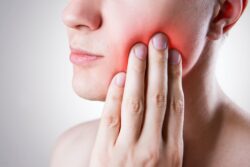About half of the world’s population will grind their teeth periodically, and about 5% of people clench or grind their teeth on a regular basis. The constant grating of the top teeth against the bottom teeth, a habit known as bruxism, will generate pressure. This could result in pain or structural damage in your teeth, jaw, or prior dental work.
Some people do not even realize they clench their teeth, so stopping this habit is easier said than done. But a dentist can assist you with diagnosing and resolving this behavior to protect your smile. Read on to find three ways that your dentist can suggest to treat chronic teeth grinding or clenching.

Bruxism Dental Treatment Options
Practice Stress Relief Activities
Dentists will usually try to treat bruxism with a conservative approach first which will address the root of the behavior. Teeth grinding often occurs due to heightened stress, which builds tension throughout the body, including the jaw, encouraging the teeth to clench.
If you can reduce the tension from stress, you can lower your chances of grinding your teeth. Stress relief can come in the form of regular physical activity or deep breathing exercises.
Your dentist may also suggest targeted facial stretches that will loosen tight muscles in the jaw. Your dentist will form a personalized treatment plan for your chronic bruxism and associated oral health complications when you schedule a dental consultation.
Wear a Custom-Made Night Guard
Many people are not aware of when they grind their teeth in order to stop doing it, especially if it occurs during sleep. A dentist can help protect your smile if you clench or grind your teeth as you sleep by giving you a custom-made night guard.
Wearing this mouthguard-like appliance will cushion the pressure from bruxism so that the behavior will not hurt your teeth, jaw, or dental work. It can also keep your jaw in a more relaxed position to relieve tension that might otherwise encourage bruxism. And the comfortable fit of a personalized device will not disrupt your sleep while you wear it.
Fix Bite Problems
Sometimes crooked teeth or dental misalignment can lead to bruxism. If you have bite problems that mean you cannot close your mouth properly, you could distribute uneven pressure across your teeth that makes them grind together.
If you amend bite problems or crooked teeth with clear braces from your dentist, you can also treat bruxism. A straighter smile will mean you do not have this unequal pressure that could harm your smile.
More severe malocclusions may need attention from an orthodontist. But your dentist can align minor alignment concerns in your smile with custom clear aligners. Wear them as directed to gradually shift teeth into a straighter position.
A teeth-grinding habit will not impact this teeth-straightening treatment. But you should consult your dentist to learn if this cosmetic dental solution can help you improve your oral health.
